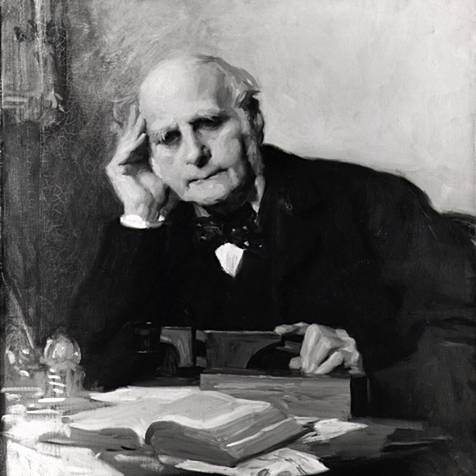Early efforts to breed better human beings have not been uniformly successful. Darwin's half-cousin, the English scientist Francis Galton, is widely regarded as the founder of eugenics. "Eugenics", a term Galton coined, comes from the Greek roots for "good" and "generation" or "origin". Eugenicists seek methods to improve the hereditary characteristics - both physical and mental - of the human species. However, eugenicists have not agreed upon which heritable traits should selected - nor by whom. Nor have they agreed on whether to use encouragement or coercion. Sir Francis Galton
(1822-1911)Sir Francis Galton, author of Hereditary Genius (1869), set greatest store by intellectual acumen. Galton himself was a redoubtable polymath: a best-selling author, a tropical explorer, a meteorologist, the founder of differential psychology, the inventor of fingerprint identification, and a pioneer statistician in the field of correlation and regression techniques. Galton coined the phrase "Nature versus Nurture"; Galton's emphasis was on the former. Although contemptuous of the effete English aristocracy, Galton believed that a person's social position in British society broadly was broadly reflective of his innate intellectual prowess. Galton favoured selective breeding "...to give the more suitable races or strains of blood a better chance of prevailing speedily over the less suitable."
Galton's proposed eugenic aristocracy would consist of talented artists, scientists and men of letters. As an upper-middle class Victorian, Galton reckoned that it was a tragedy so many dim-witted paupers sired so many children, whereas intellectually superior people, for instance himself, typically had too few. The humanitarian goal of eugenics was summarized by Galton in 1908...
" Man is gifted with pity and other kindly feelings; he has also the power of preventing many kinds of suffering. I conceive it to fall well within his province to replace Natural Selection by other processes that are more merciful and not less effective. . . . . Natural Selection rests upon excessive production and wholesale destruction; Eugenics on bringing no more individuals into the world than can be properly cared for, and those only of the best stock." (Galton, 1908, p.3233).When early eugenicists talked of improving the human stock, they normally had only white Anglo-Saxons in mind...
"The feeble nations of the world are necessarily giving way before the nobler varieties of mankind; and even the best of these, so far as we know them, seem unequal to their work. The average culture of mankind is become so much higher than it was, and the branches of knowledge and history so various and extended, that few are capable even of comprehending the exigencies of our modern civilization; much less of fulfilling them. We are living in a sort of intellectual anarchy, for the want of master minds. The general intellectual capacity of our leaders requires to be raised, and also to be differentiated. We want abler commanders, statesmen, thinkers, inventors, and artists. The natural qualifications of our race are no greater than they used to be in semi-barbarous times, though the conditions amid which we are born are vastly more complex than of old. The foremost minds of the present day seem to stagger and halt under an intellectual load too heavy for their powers."Galton apparently had no inkling of the horrific dangers posed by racist eugenics in decades to come. In 1905, he wrote about the three stages of eugenics as he conceived the new order. At first eugenics would be, Galton supposed, an academic affair; then it would a practical policy; and finally "it must be introduced into the national consciousness as a new religion." In his will, Galton endowed a chair called the Foundation Professor of Eugenics at the University of London.
Brave New World is often described as a society based on eugenic principles. But this formulation can be misleading. BNW is a statified genetic caste society where the lower orders are deliberately stunted both mentally and physically. The destiny of its five main strata is determined from an early age. Brave New Worlders consist of Alphas, destined for leadership positions; Betas, who hold less exalted but still intellectually demanding jobs; Gammas and Deltas, who occupy roles needing some intelligence; and finally Epsilons, happy morons capable of only of the most menial and unskilled tasks. The relative proportion of each caste is fixed by a World Government bureau, the Predestinators. In BNW, Predestination by God has been replaced by predestination by the World State. Individuality has been sacrified for the good of society as a whole. The underlying ethic of the regime is a misapplied utilitarianism - designed to maximise the overall happiness of society.
HOME
HedWeb
Eugenics.org
cognitive-enhancers.com
Future Opioids
BLTC Research
Huxley Hotlinks
Superhappiness?
Animal Rights FAQ
Eugenics Resources
The Good Drug Guide
The Abolitionist Project
The Hedonistic Imperative
The Reproductive Revolution
MDMA: Utopian Pharmacology
Sir Francis Galton (Wikipedia)
Who's Who in Brave New World
Brave New World by Aldous Huxley
dave@bltc.com

